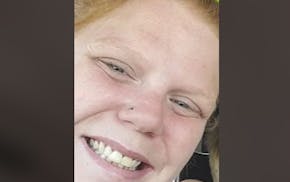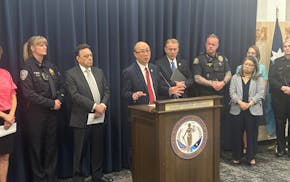VATICAN CITY — Pope Leo XIV said Friday that his election was both a cross to bear and a blessing as he celebrated his first Mass and details began to emerge of how votes swiftly coalesced to make him history's first American pope.
Freed from their conclave, cardinals began describing the hours leading up to the final ballot Thursday afternoon that brought Leo past the two-thirds majority needed. Many marveled that the Chicago-born Augustinian missionary Robert Prevost reached the threshold so quickly, given the vast diversity of voters and the traditional taboo against a U.S. pope because of the secular power the country wields.
''It is a miracle of the Holy Spirit,'' said Cardinal Fernando Natalio Chomalí Garib, archbishop of Santiago, Chile. He noted that 133 men who barely knew one another from 70 countries came to an agreement in just over 24 hours. A miracle, he said, ''and also an example for all our countries where nobody comes to an agreement.''
Leo presided over his first Mass before those same cardinal electors Friday morning, speaking off-the-cuff in English in the Sistine Chapel. He acknowledged the great responsibility they had placed on him before delivering a brief but dense homily in Italian on the need to joyfully spread Christianity in a world that often mocks it.
''You have called me to carry that cross and to be blessed with that mission, and I know I can rely on each and every one of you to walk with me as we continue as a church, as a community, as friends of Jesus, as believers, to announce the good news, to announce the Gospel,'' he said.
Leo on Saturday meets with cardinals formally. On Sunday, he is set to deliver his first noon blessing from the loggia of St. Peter's Basilica while his formal installation Mass was set for May 18.
The Americans share some details
There seemed to be mixed messages coming from a briefing with American cardinals who saw one of their own become the 267th pope. Before they arrived, the auditorium at the U.S. seminary up the hill from the Vatican blasted ''Born in the U.S.A.'' and ''American Pie.''
But more conservative cardinals seemed to distance Leo from both his citizenship and the political polemics of the Trump administration back home. They pointed to the decades Prevost spent as a missionary in Peru and said, regardless, he has a new identity now.
''Where he comes from is sort of now a thing of the past,'' said New York Cardinal Timothy Dolan, who had been President Donald Trump's pick for pope. "Robert Francis Prevost is no longer around. It's now Pope Leo.''
But Cardinal Joseph Tobin, an old friend of Prevost's who repeatedly called him ''Bob,'' said he expected the pope would be true to himself. He said that was the advice conveyed to all the electors by the retired preacher of the papal household, Cardinal Raniero Cantalamessa, who delivered a meditation in the Sistine Chapel before they took their first vote.
Tobin revealed that he had warned Prevost of his real chances of winning in the days before the voting began. But Tobin recounted the moment when saw it had sunk in for Prevost himself: Tobin had just cast his ballot before Michelangelo's "The Last Judgment'" and was returning to his seat when he saw Prevost.
''And he had his head in his hands," Tobin said. ''And I was praying for him because I couldn't imagine what happens to a human being when you're facing something like that.''
"And then when he accepted it, it was like he was made for it,'' Tobin said.
A papal Mass
The cardinals urged the public and faithful to give Leo time to get used to his new role before trying to understand what kind of pope he will be.
But some clues were already apparent. Two women delivered the readings of Scripture at the start of Leo's Mass, perhaps an indication of an intention to continue Francis' focus on expanding women's role in the church. As a cardinal, Leo put into practice one of Francis' most revolutionary reforms by having three women serve on the Vatican board that vets bishop nominations.
Speaking in near-perfect Italian, Leo lamented that the Christian faith in many parts of the world is ''considered absurd,'' mocked or opposed in the face of temptations such as money, success and power. He complained that in many places Jesus is misunderstood, ''reduced to a kind of charismatic leader or superman.''
"This is true not only among nonbelievers but also among many baptized Christians, who thus end up living, at this level, in a state of practical atheism,'' he said. ''A lack of faith is often tragically accompanied by the loss of meaning in life, the neglect of mercy, appalling violations of human dignity, the crisis of the family and so many other wounds that afflict our society.''
The cardinals applauded as the Mass concluded. Leo was seen wearing simple black shoes — eschewing, as Francis did, the red loafers of the papacy preferred by some traditionalist popes.
In another signal he might break with tradition, Leo spent his first night as pontiff in his residence in the Sant'Uffizio Palace, and not the Apostolic Palace where popes traditionally reside, Vatican News reported. Francis chose to live in an apartment in the Santa Maria guesthouse.
How did it happen? English helped
Cardinals revealed that they got to know Prevost during the preconclave discussions, not because he made some showstopping speech like Pope Francis did in 2013. Then, Cardinal Jorge Mario Bergoglio spoke about the need for the church to go to the ''existential peripheries'' to find wounded souls and was elected a short time later.
''It wasn't that he got up and made some overwhelmingly convincing speech that just wowed the body,'' said Cardinal Wilton Gregory, the retired archbishop of Washington, D.C.
This time, Prevost made an impression with his manner, in small groups. Although Italian had always been the primary language of past conclaves, this time English seemed to prevail, participants said.
German Cardinal Reinhard Marx, a close adviser of Francis, said he took note of the man who would become pope — an American with deep experience in Latin America, strong linguistic and cultural fluency, and a history of leadership as superior of the Augustinians.
''That convinced me to say this could be a possibility,'' Marx told reporters Friday. ''I can tell you, I'm very happy.''
Marx also recalled meeting the future pope last year and being struck by his temperament.
''We had a very good conversation,'' he said. ''I realized he's a man who listens, takes arguments seriously, weighs them. You can't just place him into one camp — he really tries to build bridges. I liked that very much.''
___
Vanessa Gera and Pietro de Cristofaro contributed.
___
Associated Press religion coverage receives support through the AP's collaboration with The Conversation US, with funding from Lilly Endowment Inc. The AP is solely responsible for this content.

Charge: Twin Cities woman called sister as boyfriend was 'freaking out' before he killed her

YMCA in central Minnesota to pay $140K to settle claims manager sexually harassed female workers

Minnesota wildfire risk called 'critical' as weather service issues watch

